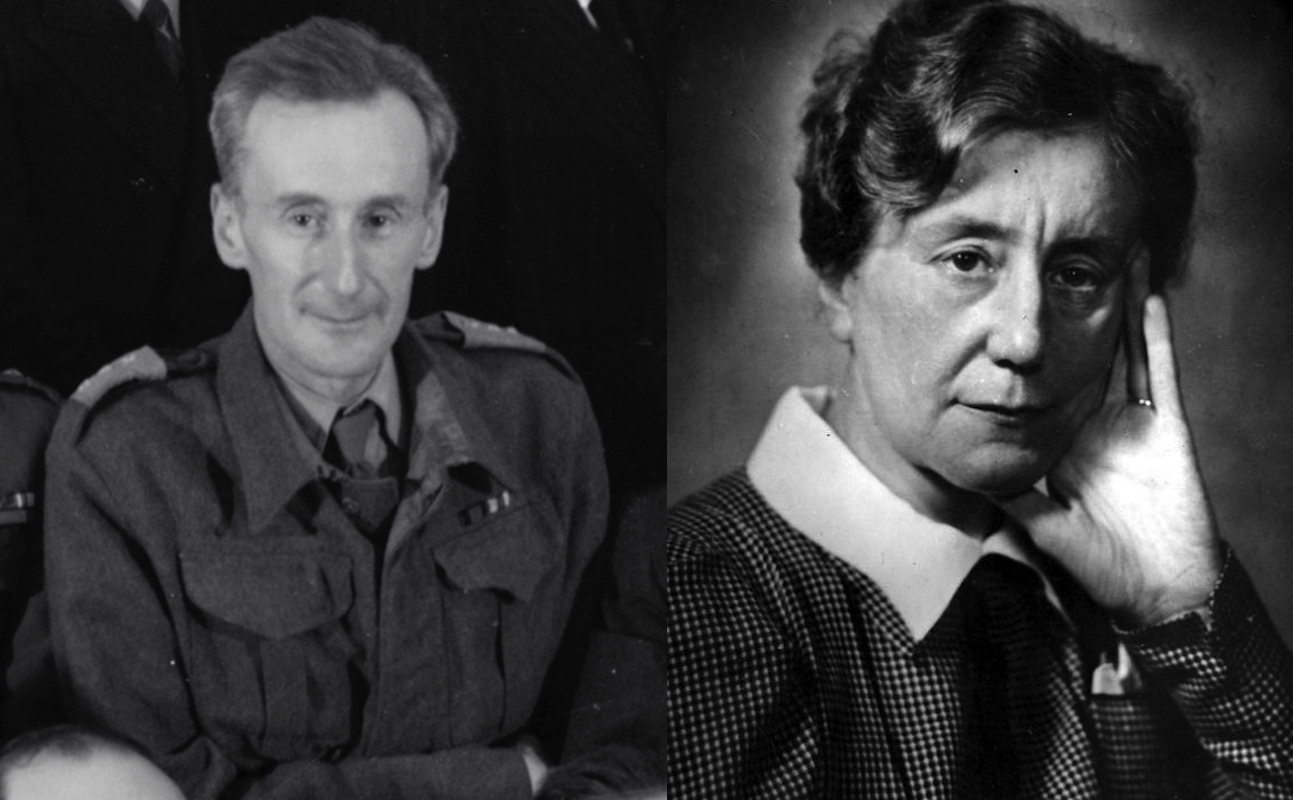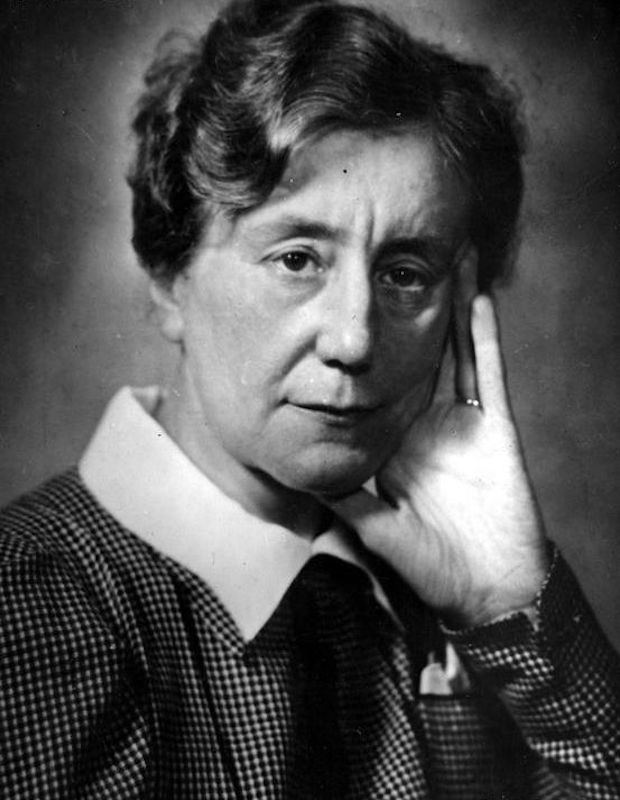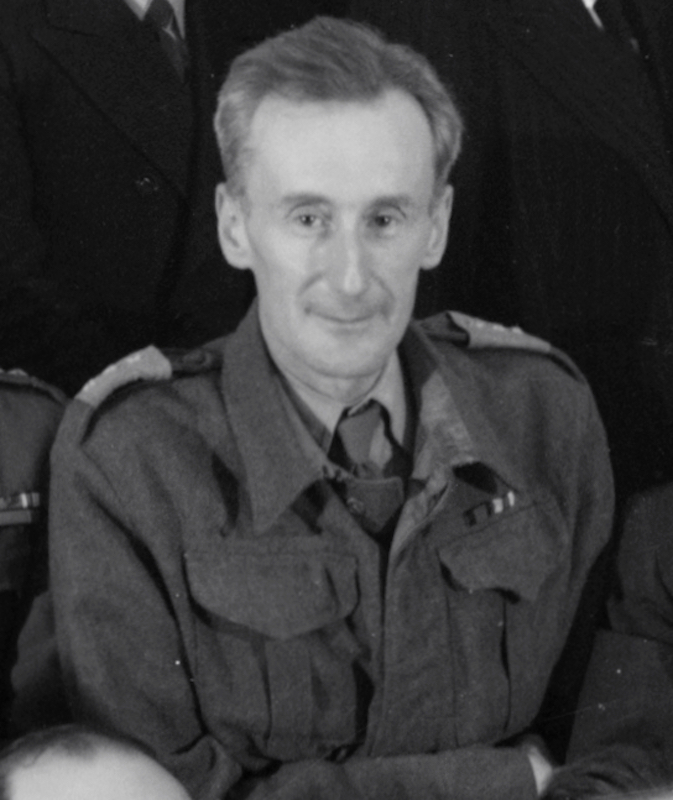Józef Czapski (1896-1993) was a major artistic and literary figure of the Cold War period Polish refugee community in the West. He was a painter, writer, a pacifist who became a military officer, a prisoner in the Soviet Union, and a witness to the coverup of one of the major war crimes of the 20th century. His sister, Maria Dorota Hutten-Czapska (1894-1981), was also a talented writer but remained in the shadow of her more famous brother. 1 Józef Czapski has had several books written about him in English. Maria Czapska has not received the recognition and appreciation that she deserves for her books and essays about literature and history although she was a recipient of several prestigious Polish literary awards. It is through her diary written during the 1944 anti-German Warsaw Uprising that I have found many references to historical events and individuals connected with my own journalistic work at the U.S. government Voice of America (VOA) radio station. Józef Czapski had one unfortunate encounter with the Voice of America when in 1950 his program about the Soviet mass murder of thousands of Polish military officers, known as the Katyń Massacre, was censored by the VOA Polish Service. I recently reread a book with essays by Józef Czapski and Maria Czapska which I have not opened in many years. 2
Their book written in Polish was published in London in 1965 and contains some of the best descriptions and observations on how history of World War II was being falsified by Soviet Communists and distorted or covered up in the West even at the time when these war events were taking place. The Voice of America, staffed during World War II by pro-Soviet propagandists and a handful of Communists, was an early participant in the falsification of history but later, thanks to many outstanding Americans as well as refugees such as Józef Czapski and Maria Czapska, became a champion of human rights and contributed to the fall of communism in East-Central Europe.
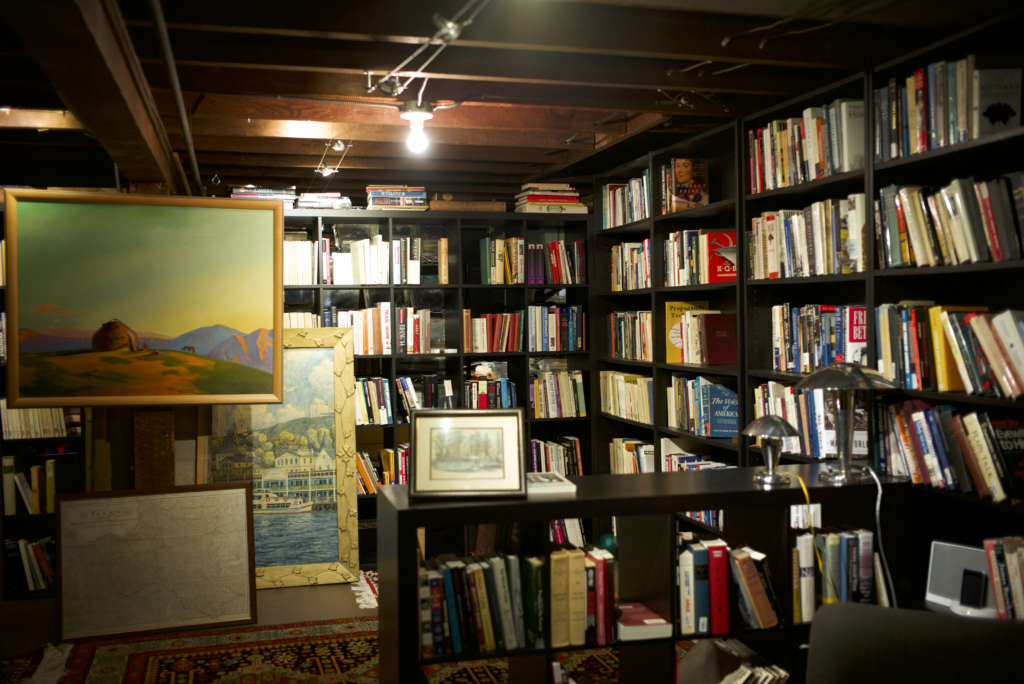
To house a half a century of books my wife and I collected from several continents, I built a library last winter in the basement of our house in Portland, Oregon, where we now live after many moves. As I discovered later, there was an unexpected benefit to this do-it-yourself project, which required purchasing and assembling more than a dozen of Swedish IKEA bookcases made in Mexico with intriguing names: Billy and Kallax. As I was arranging our books on the shelves, I found many Polish books that I have not looked at for years and even decades. Glancing through some of them, I rediscovered something I had already known when I first bought them or got them from friends. The refugee authors whom I had read with a great passion shortly after coming to the United States in 1970 as an immigrant from communist-ruled Poland were primarily concerned with protecting history from being forgotten.
These Polish émigré writers (I prefer to call them refugee writers) were even more worried that history was being distorted in the communist world, but also in the West. They saw history being used for hiding the truth and saw the spreading of falsehoods diametrically opposite of the historical truth. They also saw half-truths about history being used in the West for ideological battles.
I felt bad that I had not kept more of the trust they put in the printed word by doing more to share it in translation with American readers, although in the case of some Polish refugee authors, among them Czesław Miłosz and Józef Czapski, I continued to buy, read and cite their books in English translations and to note books about them written in English. But as I rediscovered, my Polish books, many of them less known memoirs published after World War II in Great Britain, France and the United States, contain much valuable information about history which is not found in English-language books. I also found many amazing links between the authors of these books and other authors and journalists, some of whom had worked with me at the Voice of America or had worked there before I joined VOA in December 1973.
One of the history books I reread this weekend was by a Polish refugee writer Maria Czapska, the beloved sister of the more famous Polish writer and painter Józef Czapski. The book, Dwugłos wspomnień, loosely translated from Polish as “Two Voices of Memories” consists of three essays, one by him and two by Maria Czapska. The book was published in London in 1965. Józef Czapski’s earlier historical account of his imprisonment in Soviet Russia and the Soviet murder of thousands of Polish military officers who were his fellow prisoners, was censored by the Voice of America in 1950.
Maria Czapska never worked for the Voice of America, but she survived the German occupation of Poland and provided vivid accounts of her underground anti-Nazi resistance work. During the war, she organized humanitarian aid to the Jews in the Warsaw Ghetto and wrote a program for the Błyskawica (Lightning) radio station of the 1944 Warsaw Uprising which broadcast in Polish, English, French and German. English-language Błyskawica broadcasts were prepared by the future director of Radio Free Europe Polish Service Jan Nowak Jeziorański. 3
In her Warsaw Uprising diary, Maria Czapska also describes Radio Moscow broadcasts urging the people of Warsaw to rise up against the Germans, falsely giving credit for the launch of the fighting to the Polish Communists, who represented a tiny portion of the anti-Nazi underground movement in Poland, and later condemning the leaders of the Uprising loyal to the legal Polish government in London for leading a “fascist disturbance.” Czapska also writes about British broadcasts from London but never mentions the Voice of America. BBC referred to Błyskawica broadcasts; the Voice of America, staffed by Soviet sympathizers, almost certainly did not. References to VOA cannot be found in any wartime Polish memoirs I have read, most likely because VOA broadcasts at that time were pro-Soviet, contained no first-hand information from Poland, and those writing their memoirs after the war did not want to criticize VOA after it dropped its pro-Kremlin programming and started to be critical toward Moscow and communism in the early 1950s.
Maria Czapska mentions meeting during the Warsaw Uprising the elderly mother of the Polish Government-in-Exile Ambassador in Washington Jan Ciechanowski. She could not know it when she wrote in her diary during the Uprising, but Ambassador Ciechanowski kept warning the Roosevelt Administration and members of the U.S. Congress about Soviet sympathizers being in charge of Voice of America Polish and English wartime broadcasts. 4 These pro-Moscow Voice of America wartime broadcasters included Howard Fast in charge in 1943 of English-language VOA news. After leaving VOA he was an activist and journalist in the Communist Party USA and in 1953 received the Stalin Peace Prize. 5
Czapska also mentions the death during the Warsaw Uprising of both sons of Wiktor Plater. They were relatives of Konstanty Broel Plater, a Polish journalist and former diplomat who resigned from the Voice of America in 1944 in protest against VOA broadcasting Soviet propaganda lies. As far as I was able to find out in my research of the Office of War Information archives and personnel files of OWI employees, Konstanty Broel Plater was the only VOA journalist who resigned during World War II in protest against VOA’s Soviet propaganda, but he did not publicize his protest for many years after the war most likely because he thought that he was forbidden from talking about it by a secrecy agreement which all VOA employees had to sign at that time. 6
Present in Warsaw during the Warsaw Uprising was Zofia Korbońska who maintained secret radio communications with London. Maria Czapska does not mention her, but Zofia Korbońska collaborated with the Błyskawica Warsaw Uprising radio station. After her escape from Poland in 1947 together with her husband Stefan Korboński, who was the last civilian chief of the Polish underground state during the German occupation, Zofia Korbońska was later my mentor and colleague at the Voice of America Polish Service. 7
The second essay by Maria Czapska describes her secret trip to the Warsaw Ghetto in 1941 using false identity papers and her meeting with Dr. Janusz Korczak (Henryk Goldszmit). He organized an orphanage for Jewish children before the war and ran it in the ghetto also during the German occupation. He was later murdered by the Germans in a gas chamber together with his students whom he refused to leave.
While former Voice of America broadcasters like Mira Michałowska and Stefan Arski, aka Artur Salman 8, were helping to establish a communist system in Poland, Maria Czapska escaped from Poland in December 1945 by illegally crossing the border and joined her brother in France. Many Polish anti-Nazi underground Armia Krajowa or AK (Home Army) members were being arrested, tortured and executed by the communist regime. Some were being sent to Soviet prisons and Gulag camps. The communist propaganda accused these former anti-Nazi fighters of being fascists. One of the chief communist regime propagandists was former Voice of America editor Stefan Arski. He produced anti-American propaganda and promoted the Soviet lie about the Katyn massacre. 9 Former VOA broadcaster Mira Złotowska Michałowska, who went back to Poland and married a high-ranking communist diplomat, published an article in Harper’s magazine in 1946 in which she argued that Communists in Poland believed in the rule of law. 10 Maria Czapska countered such communist propaganda but mostly in France.
While living in France Maria Czapska did some support work for Kultura, the Paris-based émigré journal and publishing house. I do not remember whether I had corresponded with her, but for a short period of time in the 1970s I was one of Kultura’s publicity agents in the United States. It was strictly a volunteer job which I had to give up because of increasing demands for my free time from my work at VOA. The VOA management did not forbid such volunteer work but in the 1970s looked at most outside activities by refugee journalists with some suspicion. I got the Czapskis’ book from Tomasz Dobrowolski, my late former colleague at the Voice of America Polish Service who was Kultura’s representative before me. Like Józef Czapski, Tomasz Dobrowolski was a wartime prisoner in the Soviet Union. It is very likely that Maria Czapska and I were in contact at that time, but the letters I had received from Kultura disappeared when we were changing houses.
Maria Czapska wrote about history and I suspect that in her support role at Kultura she encouraged publishing articles about the German occupation of Poland, the Jewish Holocaust, and the Warsaw Uprising. Kultura published in 1953 an article by a Polish journalist who had worked in London during the war and made an observation about Soviet propaganda influence over the Voice of America broadcasts. Stalin ordered the Red Army to halt their offensive against the Germans and refused to provide assistance to the fighting Poles in Poland’s capital. He calculated that the Germans would do the work of killing patriotic Poles who might oppose his plans to install a communist government in Poland completely loyal to Moscow. The uprising ended after 63 days. The Polish anti-Nazi fighters were defeated and about 200,000 Warsaw inhabitants, most of them civilians, were killed. The Germans reduced the city to ruins. Writing in Kultura, Czesław Straszewicz described how the wartime Voice of America ignored the 1944 Warsaw Uprising precisely because the Soviets wanted VOA to ignore it.
“With genuine horror we listened to what the Polish language programs of the Voice of America (or whatever name they had then), in which in line with what [the Soviet news agency] TASS was communicating, the Warsaw Uprising was being completely ignored. I remember as if it were today when the (Warsaw) Old Town fell [to the Germans] and our spirits sank, the Voice of America was broadcasting to the allied nations describing for listeners in Poland in a happy tone how a woman named Magda from the village Ptysie made a fool of a Gestapo man named Mueller.”
While Czapska’s brother was censored by the Voice of America in 1950, he and she often participated in Radio Free Europe Polish broadcasts which never resorted to this kind of censorship. Another refugee writer who was censored in the 1970s by the Voice of America was Nobel Prize laureate Alexandr Solzhenitsyn. 11 This kind of censorship was not lifted at the Voice of America until the Reagan Administration took office in 1981 and carried out management and programming reforms at VOA.
I am quite convinced that without the hard work of courageous women, Maria Czapska and Zofia Korbońska, the falsifiers of history would have had a much easier time to keep Communists in control of East-Central Europe and the Voice of America would not have been able to contribute as much as it later did to the fall of communism in the Soviet Block.
The contributions of these exceptional women are not sufficiently appreciated and false historical accounts are becoming more common in the media and even in scholarly literature. The Voice of America management today is itself contributing to the falsification of history by its own selective use of historical facts and half-truths in various promotional materials found on the web. Voice of America continues to present the first VOA Director, the late Hollywood actor John Houseman, as a defender of truthful journalism when in fact he saw himself as a propagandist and hired many of the communists who worked on early VOA broadcasts. 12 One of the communists he recruited who already worked for the Office of War Information (OWI) was Howard Fast. The Voice of America management has never admitted that the Roosevelt Administration forced John Houseman to resign because of his excessive pro-Soviet sympathies.
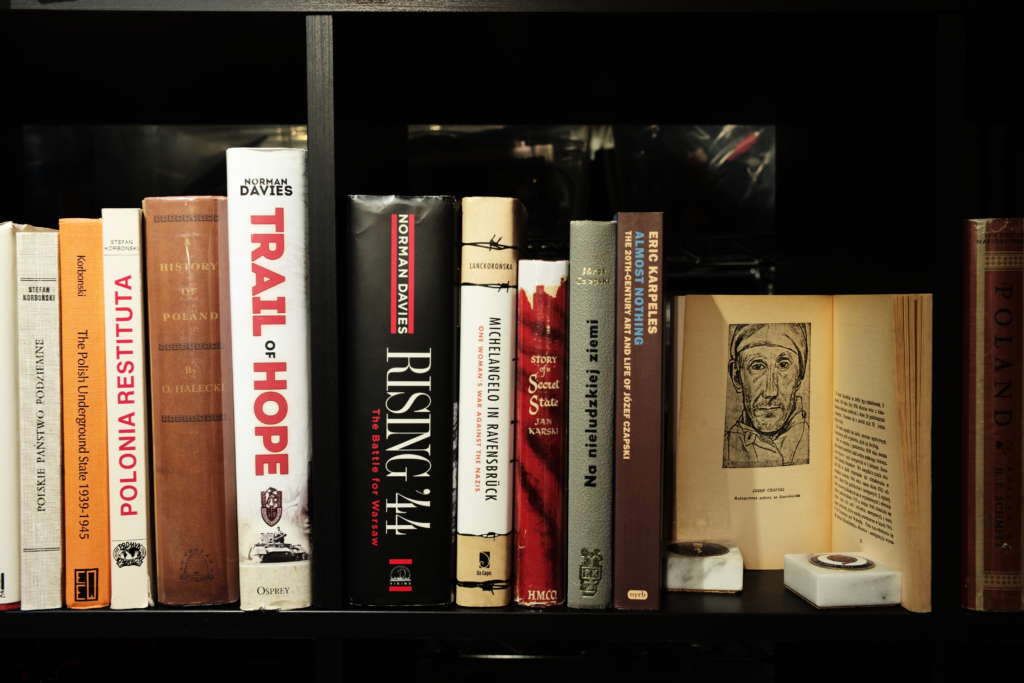
One of the photographs from my library shows Józef Czapski’s self-portrait at the Soviet Starobielsk POW camp for Polish officers. Several thousands of them were secretly executed by the Soviets in Katyn in April and May of 1940.
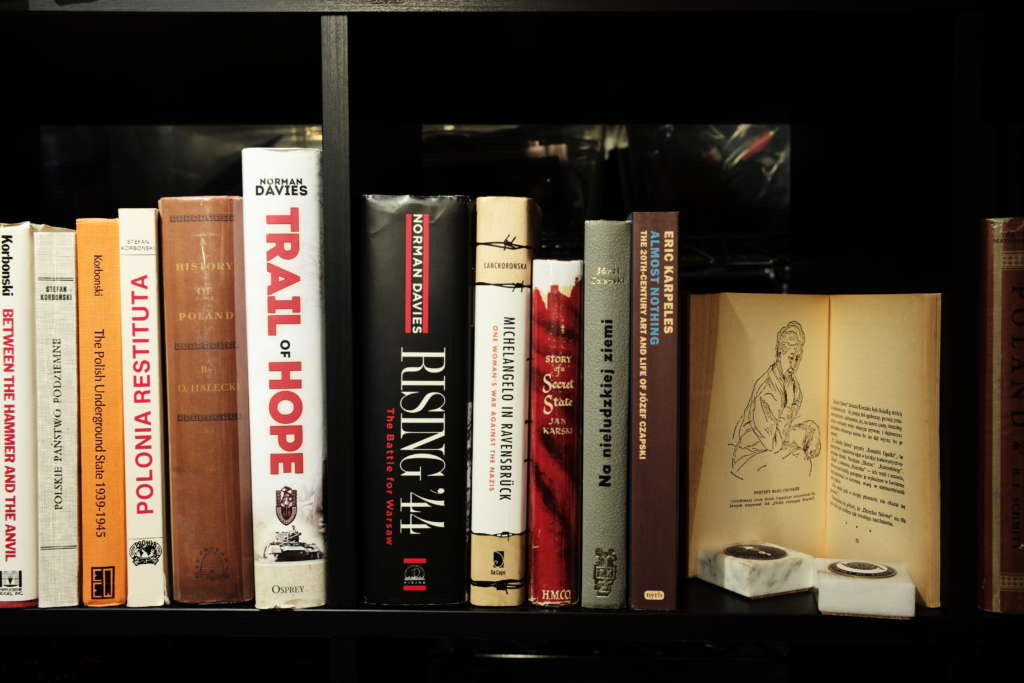
The second photograph shows Czapski’s portrait of his sister Maria Czapska.
For those interested in learning more about Józef Czapski and his art, I highly recommend Eric Karpeles’ book, Almost Nothing: The 20th-Century Art and Life of Józef Czapski, published by New York Review Books in 2018. There is also a Wikipedia entry in English for Józef Czapski and a much shorter one for Maria Czapska.
Unfortunately, no major book has been written in English about Maria Czapska.
Czapskis descended from various noble families in several Central-European countries. Their ancestors were Baltic-German, Austrian, Russian and Polish. Their father was a Polish count raised in Saint Petersburg speaking French, Russian, and German and did not learn Polish until his university years. Their mother’s Polish name was Józefa Czapska, but she was born Josephine von Thun und Hohenstein. Her brother was at one time the prime minister of the Austrian imperial government. After marrying a Pole, she adopted Poland as her homeland, learned Polish, and raised her children to become Polish patriots. They grew up on their family estate near Minsk, present day Belarus. Having a German mother and speaking German could have easily given Maria Czapska an opportunity to claim German citizenship during the German occupation of Poland. Instead, she joined the anti-Nazi resistance movement and organized humanitarian aid for the Jews, helping some of them survive the war.
Józef Czapski’s biographer, Eric Karpeles, wrote about Józef and Marynia, as she was called by her family and friends, “Each was a mixture in almost equal parts of democrat, aristocrat, bohemian and ecumenical Catholic.” Karpeles wrote that Józef and Marynia were in their youth attracted to what he called “a kind of humanitarian socialism.” 13 Marynia was more religious of the two. Despite all the suffering that he had experienced and witnessed in Russia, Józef Czapski had a deep sympathy for the Russian people and was greatly pained that Russian culture was being destroyed under the Soviet system. He met and admired Russian poet Anna Akhmatova. 14 He also met with Alexandr Solzhenitsyn after the Russian writer was forced by the Soviet regime to go into exile.
Józef Czapski was a pacifist, but he enlisted in the Polish Army to do non-combat duties. When he and his sister lived in Paris in the 1920s, he was in love with Sergey Nabokov, the gay younger brother of famous Russian writer Vladimir Nabokov. Sergey Nabokov was arrested by the Nazis in Berlin and died in Neuengamme, a large labor camp near Hamburg in January 1945 from dysentery, starvation and exhaustion. Their cousin, Nicolas Nabokov, a composer and cultural figure, worked at the Voice of America on the first VOA Russian broadcast in 1947. Even though VOA broadcast in dozens of foreign languages during the war, incredibly it did not broadcast in Russian, almost certainly out of fear that VOA Russian broadcasts might offend Stalin. Even in 1947, the first Russian broadcasts carefully avoided any direct criticism of Stalin and the Soviet Union. 15
It took several more years for VOA to change its policy of censoring criticism of communist regimes but it did during the Truman Administration. The Truman Administration quietly laid off many Soviet sympathizers among post war VOA officials and journalists. 16
Józef Czapski was one of the last victims of the pro-Soviet censorship at VOA when he was invited to record a program to Poland during his visit to the United States in 1950 and discovered that VOA refused to air the segments in which he talked about Katyń. The censoring of Józef Czapski by VOA was noted by members of Congress and their criticism of VOA’s management was printed in the Congressional Record. A year after Józef Czapski’s program for the Voice of America was censored, Ambassador Ciechanowski, whose mother Maria Czapska mentioned in her Warsaw Uprising diary, told VOA officials that their broadcasts were still “drab” and “unconvincing” for radio listeners in Poland, but they were soon improved by the Truman Administration. 17
When I was in charge of the Voice of America Polish Service in the 1980s, our correspondent Wacław Bniński recorded an interview with Józef Czapski.
Notes:
- Ela Skoczek, “Maria Czapska. Niedoceniona siostra malarza | Józef Czapski,” accessed August 25, 2021, https://jozefczapski.pl/maria-czapska-niedoceniona-siostra-malarza/.
- Józef Czapski and Maria Czapska, Dwugłos Wspomnień (London: Polska Fundacja Kulturalna, 1965).
- Eric Karpeles, Almost Nothing: The 20th Century Art and Life of Józef Czapski (New York: New York Review Books, 2018), p. 22.
- Ted Lipien, “Polish Diplomat Who Exposed Pro-Stalin U.S. Propagandists,” Cold War Radio Museum (blog), December 16, 2018, http://www.coldwarradiomuseum.com/the-polish-diplomat-who-fought-wwii-voice-of-america-pro-stalin-propaganda/.
- Ted Lipien, “Created 70 Years Ago, Stalin Peace Prize Went in 1953 to Former Voice of America Chief News Writer Howard Fast,” Cold War Radio Museum (blog), December 21, 2019, http://www.coldwarradiomuseum.com/created-70-years-ago-today-stalin-peace-prize-went-in-1953-to-former-voice-of-america-chief-news-writer-howard-fast/.
- Ted Lipien, “Hollywood’s Polish Latin Lover Who Terrorized Voice of America Broadcasters,” Cold War Radio Museum(blog), September 30, 2019, http://www.coldwarradiomuseum.com/hollywoods-polish-latin-lover-who-terrorized-voice-of-america-broadcasters/.
- Ted Lipien, “LIPIEN: Remembering a Polish-American Patriot,” The Washington Times, accessed August 25, 2021, https://www.washingtontimes.com/news/2010/sep/1/remembering-a-polish-american-patriot/.
- Ted Lipien, “Voice of America Polish Writer Listed As His Job Reference Stalin’s KGB Agent of Influence Who Duped President Roosevelt,” Cold War Radio Museum (blog), February 12, 2020, http://www.coldwarradiomuseum.com/voice-of-america-polish-editor-listed-stalins-kgb-agent-of-influence-as-job-reference/.
- Ted Lipien, “Voice of America Polish Writer Listed As His Job Reference Stalin’s KGB Agent of Influence Who Duped President Roosevelt,” Cold War Radio Museum (blog), February 12, 2020, http://www.coldwarradiomuseum.com/voice-of-america-polish-editor-listed-stalins-kgb-agent-of-influence-as-job-reference/.
- Ted Lipien, “Mira Złotowska – Michałowska — pro-Soviet Propagandist at OWI and VOA,” Cold War Radio Museum(blog), December 10, 2019, http://www.coldwarradiomuseum.com/mira-zlotowska-michalowska-pro-soviet-propagandist-at-owi-and-voa/.
- Ted Lipien, “SOLZHENITSYN Target of KGB Propaganda and Censorship by Voice of America,” Cold War Radio Museum (blog), November 7, 2017, http://www.coldwarradiomuseum.com/solzhenitsyn-target-of-kgb-propaganda-and-censorship-by-voice-of-america/.
- Ted Lipien, “First VOA Director Was a Pro-Soviet Communist Sympathizer, State Dept. Warned FDR White House,” Cold War Radio Museum (blog), May 5, 2018, http://www.coldwarradiomuseum.com/state-department-warned-fdr-white-house-first-voice-of-america-director-was-hiring-communists/.
- Eric Karpeles, Almost Nothing: The 20th Century Art and Life of Józef Czapski (New York: New York Review Books, 2018), p. 30.
- Ela Skoczek, “Anna Achmatowa i jej spotkanie z Czapskim | Józef Czapski,” accessed August 25, 2021, https://jozefczapski.pl/anna-achmatowa/.
- Ted Lipien, “VOA Broadcasts in Russian from Munich – A Backstory,” Cold War Radio Museum (blog), August 7, 2021, http://www.coldwarradiomuseum.com/voa-broadcasts-in-russian-from-munich-a-backstory/.
- Ted Lipien, “Truman’s ‘Campaign of Truth’ at Voice of America Part I: Countering Soviet Propaganda Abroad and at Home,” Cold War Radio Museum (blog), March 25, 2021, http://www.coldwarradiomuseum.com/campaign-of-truth-at-voice-of-america-part-i/.
- “Voice of America 1951 – ‘Drab’ ‘Unconvincing,’” Cold War Radio Museum (blog), February 24, 2018, http://www.coldwarradiomuseum.com/2018/02/23/voice-of-america-1951-drab-and-unconvincing-rep.-wiggleswoth-quotes-listeners-in-poland/.
